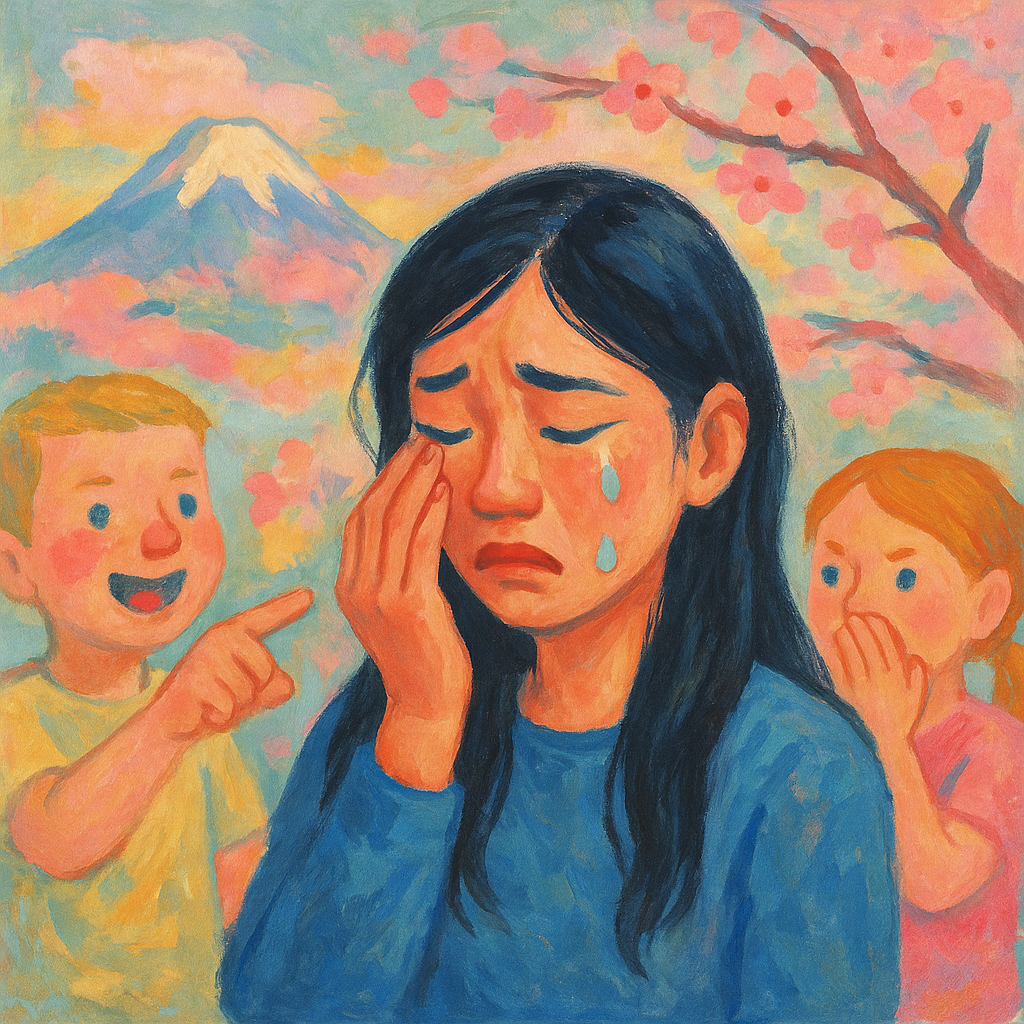I’m writing this from Japan, where I live as a German expat. Recently, a 20-year-old woman (Kimi, name changed) confided in me—her eyes filled with tears—about something that happened on her way home from work in Düsseldorf. Though she was born and raised in Germany, her features give away her Japanese heritage: her parents are of Japanese descent. A group of children under ten—strangers to her—mocked her “Asian look.” The words cut deep—for a simple reason: children grow up, and the everyday racism they speak so casually today can become far more damaging tomorrow.
Her story reveals how racist attitudes embed themselves in daily life—in furtive glances, offhand remarks, and the silence that follows. Here in Japan I encounter curiosity and openness. I’ve never been demeaned or shamed for looking white. That contrast exposes what white privilege does: it shields me. Words that pierce like small knives sow doubt in the person they wound, while the speaker remains indifferent. Both lose the chance to meet on equal ground.
In schools, prejudice flourishes when it goes unchallenged. When teachers dismiss hurtful comments as jokes, children learn that being different is wrong. Without clear rules, microaggressions vanish into the fog of the unspoken, and young people conclude that authority permits exclusion. Early intervention—mandatory reporting channels, clear procedures, regular training—could break this cycle. We need language that plainly names racism and consistent reflection rather than occasional speeches.
The process starts in families. Questions like “Does she even look German?” (or name any other “white” nationality” teach kids to sort people by appearance. Media reinforce those divisions when people of color appear mainly as villains or background figures. Parents often avoid discussing racism out of uncertainty, and that silence sends its own message: it’s unimportant. Yet it matters—deeply. Repeated exclusion harms mental health, erodes self-esteem, and breeds anxiety. The young woman who spoke with me might feel compelled to hide parts of her identity. Some internalize shame; others respond with anger, opening new wounds. Early support—counseling, peer groups, role models—can make a difference.
Policies set standards but often go unenforced. Reports of racist incidents sometimes sit unanswered for months. What would help? Fast procedures, explicit definitions of microaggressions in schools and housing, reliable data, and community projects where young people work together across cultural lines—not as a token gesture, but as a normal part of life.
Laws alone won’t stop playground bullying over skin color. In those moments, adults must have the courage to step in. Bystanders shouldn’t look away. Small acts—introducing someone who’s left out, refusing to laugh along, including new voices—still matter today. And above all, empathy matters.
Right-wing rhetoric—from Germany’s AfD to Trump and their peers—worsens these everyday wounds. When politicians speak of “cultural preservation,” “protecting values,” or “remigration,” they silently greenlight exclusion. Once racist language loses its taboo, it spreads: young people hear it on screens, see that nobody objects, and then repeat it.
Germany’s history adds gravity to this issue. The Holocaust stands as a warning of where unchecked hatred can lead. But remembrance alone isn’t enough if it isn’t tied to the present. Museums and memorials don’t draw the line from genocide to today’s casual slurs. Curricula must show how modern jokes and insults echo the same dangerous patterns.
Empathy is the key. It heals. It begins with small acts—listening, asking questions, taking people seriously. It grows when families, schools, and media actively call out exclusion. It solidifies when policies state without ambiguity: racism is not an opinion.
This work demands perseverance. There will be setbacks—the laughter after a “harmless” joke, the silence when it matters most. Yet every correction makes the next one easier. Every conversation creates new habits. Every apology opens a window for trust.
Some believe Germany’s past shields it from a return to open racism. But memory without action is toothless. Holocaust education alone does not stop discrimination in courts or police stations. Monuments don’t prevent microaggressions on the playground.
Racism feeds on convenience. It offers simple answers: “They’re different. Keep them out.” It comforts those afraid of loss. It sells false security.
To break that convenience means not looking away when a young woman walks home in tears. Not pretending a “joke” is harmless. It means showing that things can be different—with respect, genuine attention, care, and true empathy.
Kimi… She did nothing wrong.
We did.


